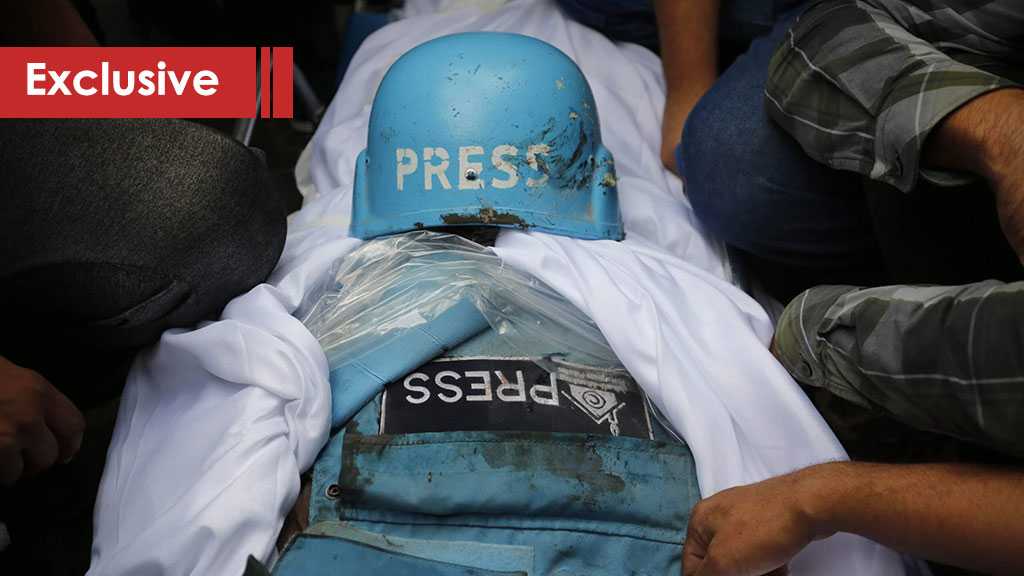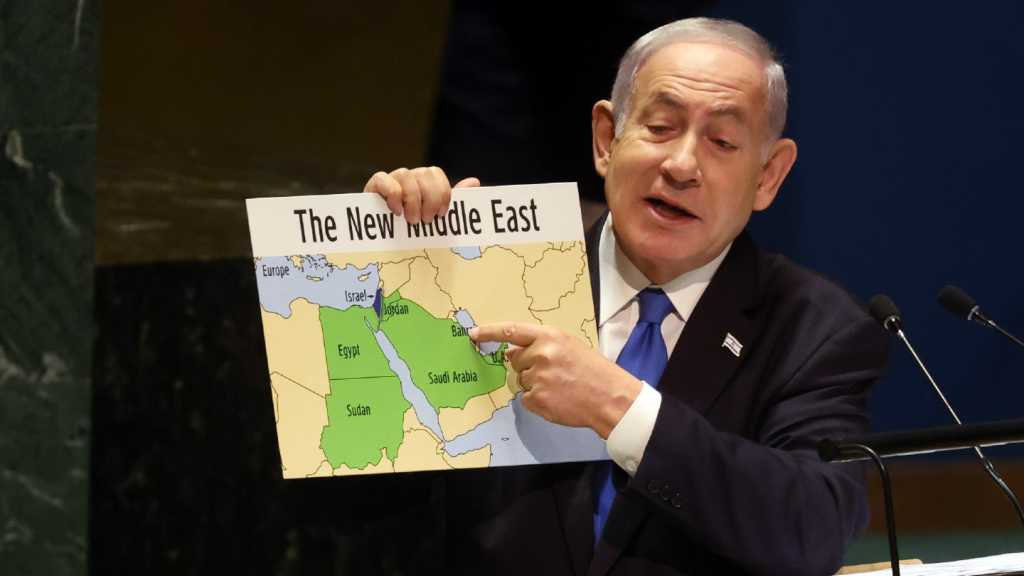The Sufferings of Journalists in The Gaza Strip

By Hiba Morad
Lebanon - Journalists in the Gaza Strip face high risks as they try to report on the conflict during the “Israeli” savage assault on the enclave. It has become hard for them to cover the news and document the “Israeli” barbarianism against Palestinian civilians, mostly women and children, a Palestinian reporter from Gaza told al-Ahed News.
A primitive life
Speaking to the al-Ahed News website, Lamis described how hard it is to carry on with her tough job as a reporter, while risking her life because “reporters are not immune and are easily killed by the “Israeli” enemy.”
She said one of her main concerns is to provide her children with the essential needs of life simultaneously, amid the scarcity of goods, food, and water in the Gaza Strip, particularly the northern part.
Letting out a long sigh, she told al-Ahed News, “During the past nine months, the occupation and war did not only affect our jobs. The Zionists have been practicing a policy of starvation against the Gazan people. I am a mother, and I have concerns other than just finishing my work as a reporter. I also want to put food on the table for my children.”
She explained what life has become like for most people inside the besieged strip.
“Life in Gaza has become so primitive. We have to start a fire outside the tent to cook using any utensils to which we have access. We need to make sure that our children are still able to eat. I have two toddlers, and making sure they eat well is not easy, just like any other toddler. During the early months of the war, there were no fruits, vegetables, bread, or flour, and it became really difficult for us to prepare appropriate food, especially for our children,” she recalled.
Stay away from family members
Lamis said she had to move out and get displaced a few times from one place to another due to the “Israeli” bombings.
“I was unable to contact my family members for two months. My family members were displaced to the South since almost the beginning of the war, and I have not seen them since,” she said anxiously.
Even my friends, whose family members were still in the north of Gaza, would see their journalist sons and daughters from a “safe distance” in fear of being attacked by “Israeli” drones.
“It was devastating when one of my friends, who is also a reporter, saw his family members survive a Zionist attack and come out of the rubble alive, but he did not dare to come closer, help them, or hug them, knowing that he could be targeted by the Zionist enemy anytime. He waved at them and shouted, telling them he loved them and praying that God would bless and protect them.”
Lamis went on to say that the homes of the majority of field reporters had been destroyed by the “Israeli” occupation forces since the beginning of the war.
“They became homeless. Many of these reporters stayed in the north of Gaza to continue their work while their families got displaced and moved to the south in fear that the Zionist soldiers might target them because their journalist sons and daughters were exposing the savage reality of the “Israeli” enemy,” she told the news website.
The reporter reiterated that it is difficult to tolerate the situation and that it is emotionally draining and exhausting to be separated from family members, displaced, and suffer due to scarcity of the basic needs of life while having to focus on a tough job like reporting and journalism.
“My brother and his wife were injured in the South during “Israeli” attacks, and I cannot tell you how tough it is to be able to control your nerves when you hear such news and you are far away and do not exactly know how bad things are,” she recalled with a shivering voice.
“My brother was trapped in Shuhada al-Aqsa hospital for a period when the “Israeli” occupation army was attacking the medical complex,” she added.
However, she stressed that all this awfulness will not stop reporters from continuing their work to speak out and spread the truth.
Tough times at work
Lamis also told al-Ahed News that reporters and journalists faced tremendous problems in terms of work.
“It was really hard to recharge our laptops or mobile phones, especially at the beginning of the war. I had to go up to the rooftops of the buildings, trying to catch a signal so that I could continue my work or send the reports I would write. Also, sometimes we had no access to the internet or electricity, and we dealt with our phones and laptops as if these were precious gems.”
Most of the reporters stayed at hospitals, Lamis said, adding, “Mostly because we were able to access the internet and carry out our work. However, many of the reporters were arrested after the hospitals were raided. Reporters in Gaza were exhausted, had no place to go, and had no food or a scarce amount of food, just like the regular Gazan people.”
Lamis explained, “Being a field reporter is a tough job, and it requires that you have some equipment, access to the internet, be able to easily recharge the batteries of your laptop, camera, and phone, and a lot of rest at night due to the nature of the job.”
“However, all the things mentioned above have become a luxury that we do not enjoy,” she added.
Few reporters
For his part, Ahmad, speaking from the north of Gaza, said, “We, reporters in the north of Gaza, are very few now.”
“Several reporters were arrested and jailed in the prisons of the “Israeli” enemy, and many of them are still behind bars, such as Mohammad Arab and others. The other majority of reporters were forced by “Israeli” occupation forces to get displaced to the south of Gaza,” he noted.
168 reporters have been killed by the Zionist entity since the beginning of the war on October 7. Human rights agencies have repeatedly called for the protection of journalists in the enclave. In February, UN experts warned that “targeted attacks and killings of journalists are war crimes.”
Dangerous Press Vests
Ahmad said that the majority of reporters no longer wear press safety vests. “These have become sort of fingers of accusation against us, or a flag telling the Israeli forces they should shoot or bombard us. We are trying to work in the shadows and away from the limelight,” he explained.
According to the Committee to Protect Journalists [CPJ], “Journalists are civilians and are protected by International Law. Deliberately targeting civilians constitutes a war crime.”
Survivors
Experiencing starvation is not pleasant at all.
Ahmad told al-Ahed News, “The famine we went through and are still going through affects our capability to work a lot, and this was true especially during the holy month of Ramadan, when we would remain for three to four days without any food.”
However, according to Ahmad, people, including reporters, were able to come up with alternatives to the classic methods of cooking or preparing food and were able to survive well.
“This defines who we are as Palestinians; we never give up, no matter what the hardships are.”
Reporters in Gaza make a distinct painful story of mere suffering. They are under pressure on all levels, far from family and loved ones, hungry and tired, struggling to keep the work equipment and its batteries alive, worried about family members, facing direct Israeli threats due to the nature of the war in the North, and being a parent also obviously adds to the struggle.
Comments




